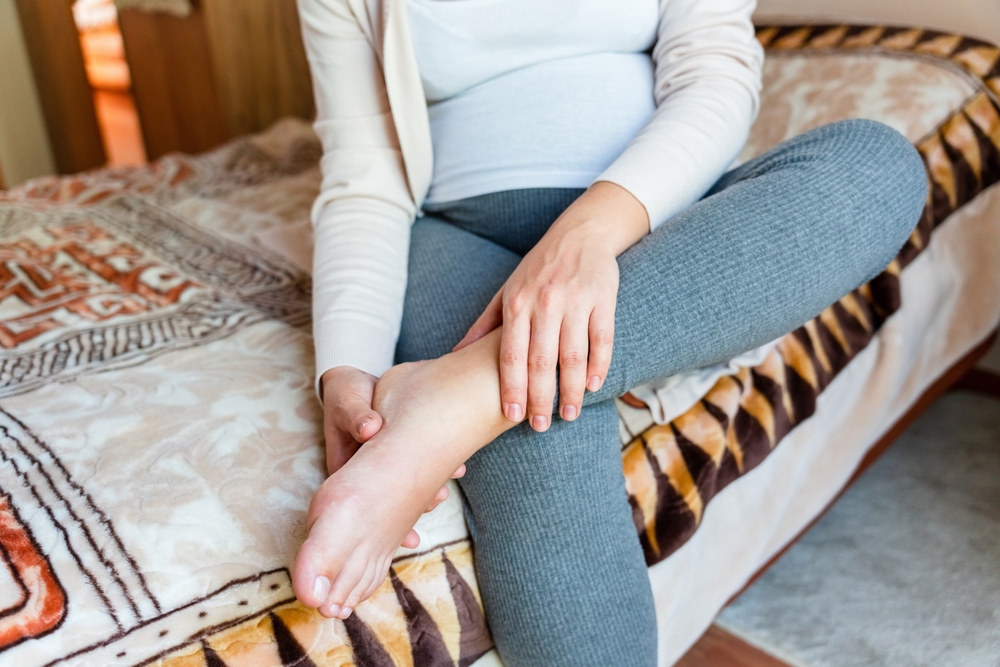Going through pregnancy is not an easy feat. Your body gets vulnerable to many challenges you never even thought would come for you. One such unexpected challenge is arthritis during pregnancy.
Now, you may wonder how arthritis can happen to you. Isn’t it an old-age disease? Hold that thought because arthritis can affect even a young lady when she gets pregnant. This condition, marked by joint inflammation and pain, can make this demanding period even more challenging.
Let’s explore the causes and symptoms of arthritis during pregnancy. Most importantly, we will provide valuable insights into home remedies and lifestyle tips to help manage this condition effectively.
Table of Contents
Understanding Arthritis During Pregnancy
Arthritis is a broad term encompassing various conditions affecting the joints, and it can strike at any age, including during pregnancy.
While it’s not as common as other pregnancy-related issues, arthritis can still cause discomfort to expectant mothers.
Several factors can contribute to the development of arthritis during pregnancy:
Hormonal Changes
Pregnancy involves significant hormonal fluctuations, particularly an increase in the hormone relaxin.
Studies suggest this hormone helps relax the uterine muscles but can also affect joint tissues, potentially leading to joint pain and inflammation.
Autoimmune Conditions
Some women may already have autoimmune conditions like rheumatoid arthritis or lupus before pregnancy.
Pregnancy can sometimes exacerbate these conditions, leading to increased joint pain.
Weight Gain
The natural weight gain during pregnancy can put added stress on the joints, particularly those in the lower back, hips, and knees.
This added strain can exacerbate arthritis symptoms.
Genetics
A family history of arthritis can increase the likelihood of experiencing it during pregnancy.
Symptoms of Arthritis During Pregnancy
Arthritis during pregnancy can manifest in various ways and can affect different joints. Common symptoms include:
- Joint Pain: Expectant mothers with arthritis often experience joint pain, which can be mild to severe and may affect one or multiple joints.
- Swelling: Joint inflammation can lead to swelling, making it difficult to move the affected joints.
- Stiffness: Joint stiffness is a common symptom, particularly in the morning or after prolonged periods of inactivity.
- Reduced Mobility: As arthritis progresses, reduced mobility and range of motion can become problematic, making daily tasks and movements more challenging.
- Fatigue: Dealing with chronic pain and discomfort can lead to fatigue and exhaustion, impacting overall well-being.
Recommendation: Dr Wehbah Sarwar is a renowned physiotherapist. Based in Lahore, she has years of experience in pain management field, treating all kinds of gynecological pain problems as well.
Managing Arthritis During Pregnancy
Now, you have a better understanding of arthritis during pregnancy. Let’s explore some effective ways to manage and alleviate its symptoms.
It’s important to note that before trying any remedies or making lifestyle changes, consult your healthcare provider to ensure they are safe for your situation.
Gentle Exercise
Regular, low-impact exercise can help improve joint flexibility and reduce pain.
Activities such as swimming, prenatal yoga, and stationary cycling are excellent options. Always consult a healthcare professional or a certified prenatal fitness instructor for guidance on suitable exercises.
Hot and Cold Therapy
Applying heat or cold to affected joints can provide relief.
A warm bath, heating pad, or warm compress can help relax tense muscles and reduce stiffness. Cold packs or ice packs can help alleviate inflammation and numb pain.
Proper Rest
Getting enough rest is crucial for managing arthritis during pregnancy.
Ensure you have a comfortable sleep environment, and consider using pillows to support your joints. Adequate rest can help reduce fatigue and improve overall well-being.
Suggested Read: What is the Best Time to Sleep and Wake Up?
Maintain a Healthy Diet
Eating a balanced diet rich in anti-inflammatory foods can be beneficial.
Include fatty fish (salmon, mackerel), fruits, vegetables, whole grains, and nuts in your diet. Omega-3 fatty acids found in fish can help reduce inflammation.
Weight Management
Managing your weight during pregnancy is essential, as excess weight can worsen arthritis symptoms.
Consult your healthcare provider to establish a healthy weight management plan tailored to your needs.
Medications and Supplements
Certain medications and supplements usage may be safe during pregnancy, but always consult your healthcare provider before taking any. They can guide you on appropriate pain relievers or supplements like omega-3 fatty acids or glucosamine.
Physical Therapy
A physical therapist can develop a customized exercise and stretching routine to alleviate arthritis symptoms and improve joint function.
Regular sessions with a physical therapist can be highly beneficial.
Joint Support
Wearing support braces or wraps can provide stability to affected joints and reduce pain. Consult your healthcare provider or a physical therapist to determine the most suitable support options.
Stress Management
Managing stress through relaxation techniques such as meditation, deep breathing exercises, or mindfulness can help reduce muscle tension and improve overall well-being.
Suggested Read: Harness the Power of 4-7-8 to Reduce Stress and Boost Mental Well-Being!
Consult a Specialist
If your arthritis symptoms are severe or not responding to conservative treatments, consider consulting a rheumatologist, a specialist in arthritis and related conditions.
They can provide advanced treatment options and guidance specific to your situation.
When to Visit a Gynecologist?
While arthritis during pregnancy can be challenging, it is manageable with the right strategies and support.
Remember that each pregnancy is unique, and what works for one person may not work for another.
Consult a qualified gynecologist throughout your pregnancy to ensure you receive the best care.
